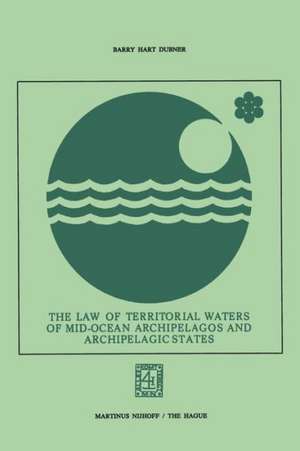The Law of Territorial Waters of Mid-Ocean Archipelagos and Archipelagic States
Autor Barry Hart Dubneren Limba Engleză Paperback – 1976
Preț: 378.92 lei
Nou
Puncte Express: 568
Preț estimativ în valută:
72.50€ • 75.91$ • 59.99£
72.50€ • 75.91$ • 59.99£
Carte tipărită la comandă
Livrare economică 07-21 aprilie
Preluare comenzi: 021 569.72.76
Specificații
ISBN-13: 9789401503891
ISBN-10: 9401503893
Pagini: 136
Ilustrații: 122 p. 2 illus.
Dimensiuni: 155 x 235 x 7 mm
Greutate: 0.2 kg
Ediția:1976
Editura: SPRINGER NETHERLANDS
Colecția Springer
Locul publicării:Dordrecht, Netherlands
ISBN-10: 9401503893
Pagini: 136
Ilustrații: 122 p. 2 illus.
Dimensiuni: 155 x 235 x 7 mm
Greutate: 0.2 kg
Ediția:1976
Editura: SPRINGER NETHERLANDS
Colecția Springer
Locul publicării:Dordrecht, Netherlands
Public țintă
ResearchCuprins
I. Introduction.- II. General Discussion of Traditional Terms and Governing Concepts Regarding Law of the Sea.- Internal Waters.- Territorial Sea.- Baselines.- Innocent Passage.- Contiguous Zone.- Continental Shelf.- High Seas.- III. General Discussion of the Law of Territorial Waters of Islands and Coastal Archipelagos as distinguished from the Law of Territorial Waters of Mid ocean Archipelagos and Archipelagic States.- Definitions.- An Island Adjacent to a Coast.- Artificial Structures as Islands.- Islands, Rocks, Promontories that are Part of a Coastal Configuration.- Controversies Arising Out of the Legal Treatment of Groups of Offshore Islands.- IV. A Review of the Historical and Traditional Approaches to the Application of the Law of Territorial Waters of Mid-Ocean Archipelagos and Archipelagic States.- Private Scientific and Scholarly Organizations.- The Hague Codification Conference, 1930 (Conference for the Codification of International Law, League of Nations).- Preparatory Work of the International Law Commission.- Geneva Conference on the Law of the Sea, 1958.- Customary International Law.- Treaties as Evidence of Customary International Law.- Legislative and Executive Decrees, Declarations and the Practice of States.- Publicists and Legal Writers Usually State the Problem in Traditional Terms.- Leading Law Review Articles Treat the Problem in Traditional Terms.- V. Proposed Solutions to the Problem, in General.- The Guidelines of the Archipelagic States, Dated March 14, 1973.- The Formal Proposal of the Archipelagic States, Dated August 6, 1973.- The United Kingdom Proposal as Representative of the Views of the General Maritime States.- The Geographers’ Proposals.- VI. On the Emerging Definition of an Archipelagic State.- The Philippines.- The PhilippineDeclaration.- The Philippine Declaration in Practice.- Indonesia.- The Indonesian Declaration.- The Indonesian Declaration in Practice.- An Archipelagic State Defined.- VII. A Proposed Recommendation for Determining the Territorial Waters of Archipelagos (Whether Constituting a single state or portion of a state).- The Classic Problem of the Resolution of Conflicting Interests in the Law of the Sea: Special Interests v. General Interests.- Limitations on the Use of Precedent.- Proposed Solution.- Fishing Rights.- Appendixes.- Table of Cases.








